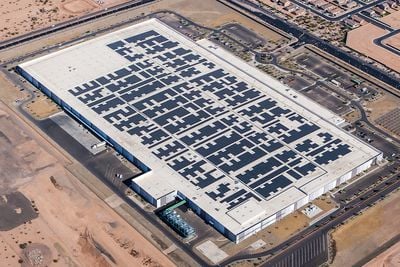A new report from Bloomberg takes a look at how Mesa, Arizona was able to secure its deal with Apple to bring the company's new sapphire manufacturing plant to the city. That facility is set to begin operation this month with production at a scale massive enough to support a shift to sapphire display covers for the next-generation iPhone.

The report notes that Mesa and the State of Arizona moved aggressively to reach a deal with Apple and its partner, GT Advanced Technologies, learning from previous negotiations that saw Arizona lose out to Austin, Texas for an expansion of Apple's operations facilities. As a result, Mesa and Arizona officials made every effort to offer specific incentives, expedite permitting approvals, and even build out power infrastructure to meet Apple's demands.
Time was of the essence since Arizona had lost out on the previous Apple facility to Texas less than two years earlier and was nervous others might trump its bid. Officials typically had just a few days to respond to Apple’s questions, [Mesa mayor Scott] Smith said.
One sticking point: power. Apple wanted the facility to use 100 percent renewable energy and negotiated with the state and local power company, Salt River Project, about how to make that happen. New solar and geothermal projects are being built because of the project. Apple also got officials to agree to construct a new power substation for the plant.
Other benefits for Apple include a $10 million grant from the state to support building improvements and hiring efforts, as well as a special designation for the property that will cut Apple's property taxes by over 70 percent.
Mesa and Arizona are already seeking to leverage Apple's arrival to create a new technology corridor in the area where Apple's facility is located, with a number of companies having already contacted officials to express interest in locating near Apple.






















Top Rated Comments
According to the article it states it gave $10m to Apple in the form of a grant for building improvements and for hiring. This seems appropriate to me in the sense that the building was empty not generating any income to the state. Now you get construction workers working on the improvement and you get others working in the plant through this grant. And the state probably saves in unemployment benefits and increased personal income tax revenue. I suspect they will get there $10m back in due course. And as for the tax break, I assumed that they looked at it and said 30% taxes of fully operational plant is better than 100% of nothing.
I agree that on the surface it is sometimes difficult to understand why the folks in power (that we somehow put there) do the things they do. But before we pass judgment, I would want to see the numbers. Often times the numbers show that the state benefits over time. Sometimes it shows that we put the wrong folks in office. Without knowing enough about the details, I think one should not automatically assume that this was bad for the state (it may be, but I see nothing in the article that would suggest it).
To be fair, Arizona has had (and still has) a big semiconductor industry and many of the skills needed at this sapphire plant are already here in the form of trained Intel, Motorola and Sumitomo people.
As for renewable energy, SRP doesn't have much. They will most likely be buying power from APS's Solana solar-thermal plant. SRP is not even really a player in renewables, choosing to expand natural gas plants instead.
Government is too big and provides too many handouts. They have too much red tape and too many regulations. They overextend themselves and as such, they have created this massive machine that has to be fed with your money. Taxation is becoming such a huge burden to citizens and businesses that offering a break in taxes is enough for a company to choose which state they want to do business in.
Don't you see the problem? You think businesses should be thankful for the "opportunity" to run a business? I don't think so. Government should do its best to not be in the way and should strive to be as minimal a burden as possible to businesses and its citizens.
The US government is setting themselves up to be the provider of all, and you will have to belly up to the government table to get or do anything.
This is not going to end well.
if you've ever compared the prices at two stores and opted for the one that had a lower price even though they pay their employees less, you are doing the EXACT SAME THING.